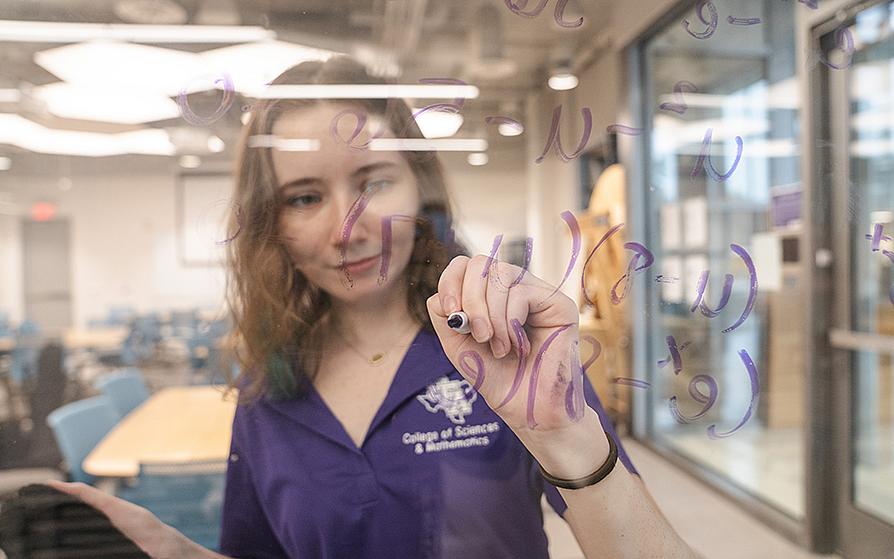Becoming a mathematics and statistics researcher
If you want to earn the title of “mathematician,” you’ll need more than coursework. The best way to learn mathematics is to do mathematics – and that’s why we encourage our majors to participate in learning activities and projects outside the classroom. As a mathematics major, you’ll have the opportunity to work with your professors and your fellow Lumberjacks on hands-on research projects that solve real-world problems.
Honors research projects
At SFA, we believe that research is a critical component of the college experience. That’s why we provide opportunities for undergraduate students to participate in projects that provide hands-on experience.
Students in the Department of Mathematics and Statistics can dip their toes into unique honors research projects on a wide variety of topics. Examples of past honors research projects include:
- Developing a timeline for the evolution of geometry
- Investigating Euler’s formula as a bridge between exponential and trigonometric functions
- Developing a statistical model that describes the ways SFA students use textbooks
- Studying student data to determine if there is a correlation between their final grade and their homework completion rate
- Using photography to find examples of geometry in architecture
Take a deeper dive
Many of our mathematics and statistics students choose to get involved with challenging undergraduate research projects. Our undergraduate research projects provide for a more in-depth version of research experience than our honors projects, as well as opportunities for students to work one-on-one with professors who share their interests. Many of our students present their research projects at annual mathematics conferences such as the Texas Undergraduate Mathematics Conference or the Texas Section meetings of the Mathematical Association of America.
Examples of past projects undergraduate research projects include:
- Demonstrating a solution to the triangle cutout problem with extensions
- Describing the set of constant transversal matrices using a vector space basis
- Creating a model that describes the ecosystems involved in swarm behavior
- Studying approximations to the matrix exponential
- Probabilities in Pascal’s Triangle
- Understanding the conditional probabilities involved in analyzing the likelihood of breast cancer
Graduate research
As a graduate student, research opportunities are also available and encouraged. Mathematics students who choose to pursue the Master of Science in Mathematical Sciences have the opportunity to replace six hours of graduate coursework with six hours of research on a project of their choice.
To learn more about the graduate programs available in the Department of Mathematics and Statistics, visit our graduate programs page.
Your thesis project will demonstrate your mathematical understanding as well as your ability to apply what you have learned. The project requires much dedication and will be the center of your world for the year you devote to the study. As with the undergraduate projects, you will have opportunities to present your work within the department as well as at conferences.
Examples of past thesis titles include:
- Blind prediction: Do societal factors predetermine a school district’s testing pass rates?
- Recovering a random variable from conditional expectations using reconstruction algorithms for the Gauss Radon Transform
- An exploration of near-rings using Sage
- Interaction between classroom experience and pedagogical content knowledge: A study in secondary mathematics
- Subjective dimensional representations
- An introduction to the algebra of normal families
- Topics in spatial point processes
- Instructional methods of secondary mathematics teachers and the influence of teacher preparation programs and supplementary mentoring
Great researchers. Great teachers.
Our mathematics and statistics professors are great teachers – but they’re also great researchers with a diverse range of interests. Professors from the department have been recognized nationally for their expertise in their fields, and some have even earned an international reputation for their research.
Interested in pure mathematics or applied mathematics? Want to study probability or statistics? Looking for an in-depth study of mathematics education? Whatever you’re into, you’ll find a professor who shares your interests.
 Axe ’Em, Jacks!
Axe ’Em, Jacks!
